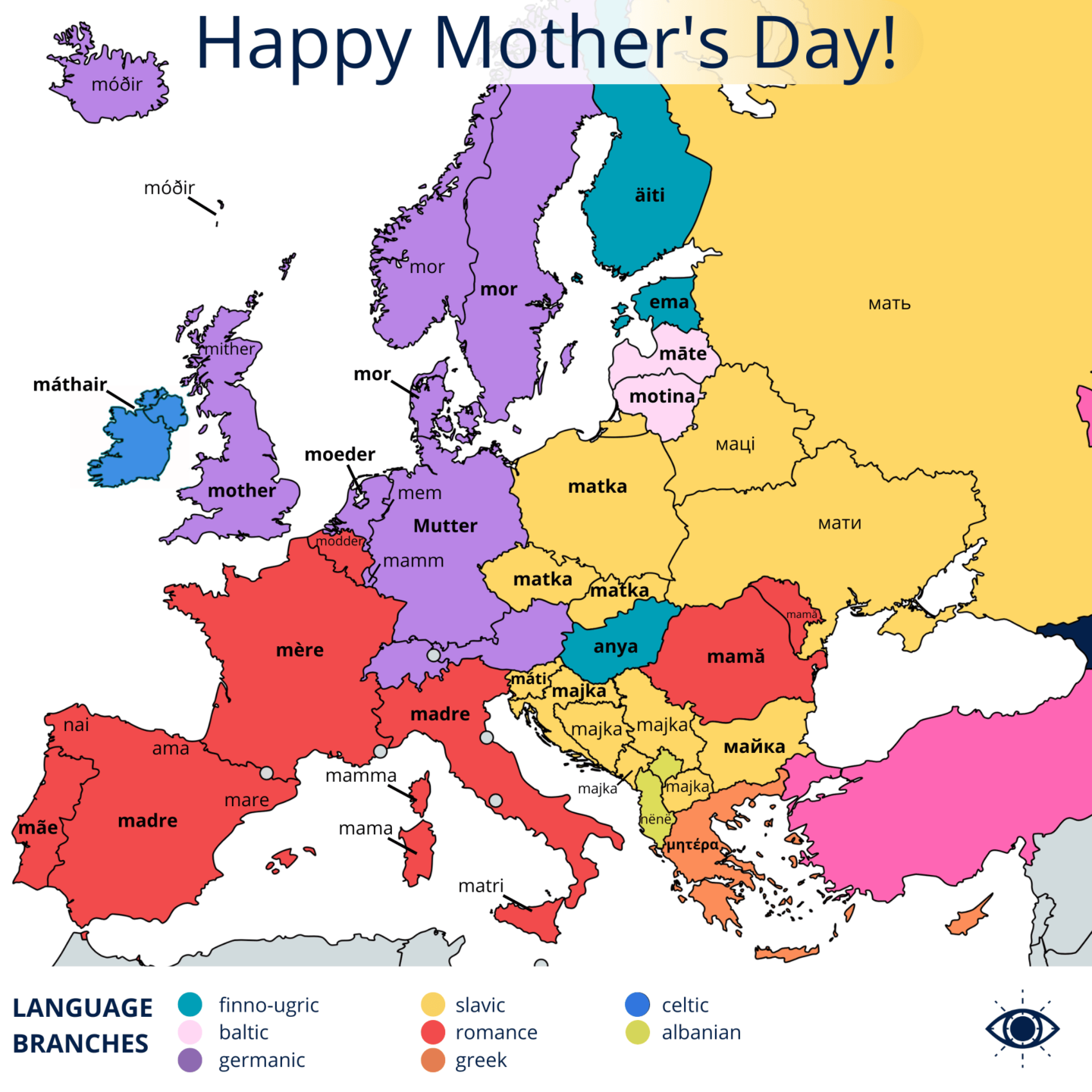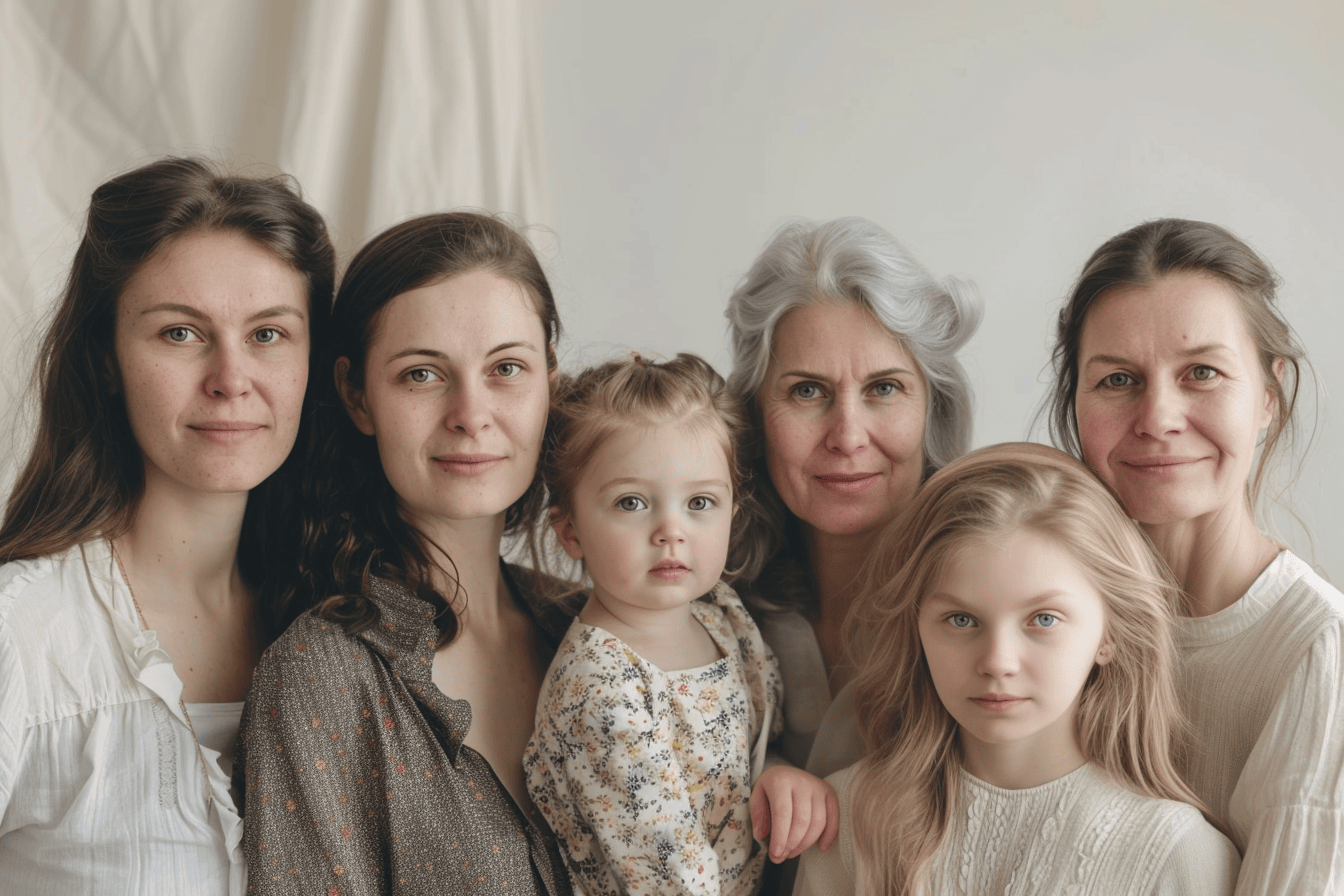Mothers in European Languages
Europe’s linguistic diversity can often come as a surprise. Although the European Union has 24 official languages as of 2024, according to Ethnologue, Europe as a continent speaks more than 300 languages. In order to gain a deeper understanding of the languages and connections between different regions, we’ll explore the origins of the word ‘mother’ in various European languages in this post, dedicated to Mother’s Day.

Indo-European languages
In terms of language families, Indo-European languages are the most widely spoken in Europe, where they are further divided into five language groups: Romance, Germanic, Baltic, Celtic, and Slavic. Albanian and Greek, neither of which belong to a separate subgroup, are also classified as Indo-European.
In south-western Europe, Romance languages are predominantly spoken. ‘Mother’ in Italian and Spanish is madre (the same in Asturian), in Portuguese mãe, in Romanian mamă, and in French mère. Similar spellings or pronunciations can also be found in smaller Romance languages—mai (Aragonese and Mirandese), mama (Sardinian), mamã (Aromanian), mamma (Corsican and Romansh), mare (Catalan), matri (Sicilian), and nai (Galician). Given the significance of ‘mother’ in everyday conversation, many languages have an endearing word for it—such as maman in French and mamá in Spanish. It is thought that all Romance language cognates for ‘mother’ derive from the Latin *mātēr, which traces its roots back to the Proto-Indo-European word *méh₂tēr.
Germanic languages, however, are dominant in the north-western region of Europe. Like other Indo-European language groups, the term for ‘mother’ in Germanic languages also originates from the Proto-Indo-European *méh₂tēr. In the Nordic-Germanic branch, the equivalent of ‘mother’ is moder in Swedish, Norwegian and Danish (now more commonly abbreviated to mor), and móðir in Faroese and Icelandic (the same form was also used in Old Norse). In the West Germanic languages, it is mother in English, Mutter in German, moeder in Dutch and Flemish, modder in Limburgish, mamm in Luxembourgish, mem in Frisian, and mither in Scots. Affectionate variants of the word exist in Germanic languages as well, such as mommy in English and Mütterchen in German. The Germanic cognates for ‘mother’ were derived from the Proto-Germanic *mōdēr.
The third largest Indo-European language group on the continent is the Slavic languages, spoken across several countries in eastern and south-eastern Europe. In the Slavic languages, ‘mother’ is denoted by words such as majka/майка/мајка(in Bosnian, Croatian, Montenegrin, Serbian, Bulgarian, and Macedonian, and as an endearing word majčica), matka (in Polish, Slovak and Czech), mać (in Sorbian), máti (in Slovene), мати (in Ukrainian), мать (in Russian; also мама), and маці (in Belarusian). All these words come from the Old Slavonic word *mati, which also has its roots in the Indo-European *méh₂tēr.
Celtic is a smaller language group whose speakers can be found throughout the British Isles. Notably, Irish is the only Celtic language with official status in the European Union. Modern Celtic words for ‘mother’ are derived from Old Celtic *mātīr. These contemporary cognates include Scottish Gaelic màthair, Irish máthair, Cornish mamm, Welsh mam and Manx moir. In north-eastern Europe, there is a small language group known as the Baltic languages. Mothers are addressed as māte in Latvian and motina in Lithuanian (both presumably derived from the Proto-Balto-Slavic *mā́ˀtē). Unlike other Indo-European languages, Greek and Albanian do not belong to a language subgroup of their own. According to etymologists, μητέρα—the Greek word for ‘mother’—comes from the Ancient Greek μήτηρ (again derived from the Proto-Indo-European *méh₂tēr). The Albanian equivalent nënë comes from the Proto-Albanian *na(n)nā, which stems from the Proto-Indo-European *nan(n)-eh.
Uralic languages
The second largest language family in Europe is represented by the Uralic languages, where several of the cognates for ‘mother’ derive from the Uralic word *emä. These include Estonian ema, Võro imä, Seto ime, Livonian ǟma, Vepsian mam, and Ingrian emoi. In Finnish, the word emä is used only to refer to female animals. Similar to Meänkieli and Karelian, ‘mother’ in Finnish is äiti, which is believed to stem from the Proto-Germanic word *aiþį̄. In Hungarian, the word for ‘mother’ is anya, which is also thought to have Uralic roots. In the Sámi languages in northern Europe, mothers are called jeäʹnn (in Kolt Sámi), eadni (North Sámi), enni (Inari Sámi), and iodine (Lule Sámi), all originating from the Proto-Sámi root *eannē.
Other language families
In addition to the Indo-European and Uralic languages, three other unique languages are spoken in the European regions. One of them—Basque—is a language isolate spoken in Spain and France, meaning that no known languages are related to it. In Basque, the word for ‘mother’ is ama. Although there is no consensus among etymologists about the origin of ama, historical records suggest that the word was in use as early as 1028. Another unique language is Gagauz, which belongs to the Turkic language group in the Altaic language family. Gagauz is spoken in Moldova. In the Gagauz language, the word for mother is ana, which is a derivation of the similar Proto-Turkic word *ana. The last distinctive language we’ll look at holds official status in the European Union. This language is Maltese. Maltese belongs to the Semitic language group within the Afro-Asiatic language family. The word for ‘mother’ in Maltese is omm, which is derived from the Arabic أُمّ(‘umm), whose roots can be traced back to the Proto-Semitic *ʔimm-.
